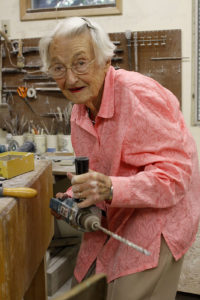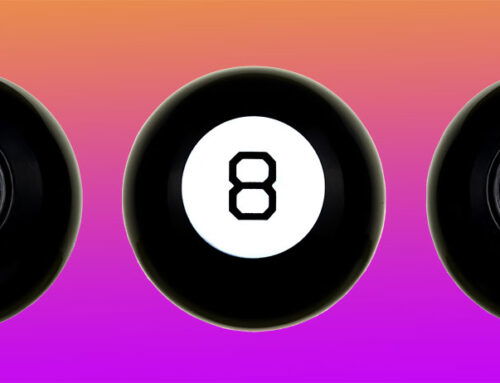Among my pet peeves is the commonly accepted notion that creativity slips away with age. What pressure that puts on the first half of life! Imagine that you’re 40, still young. Are you really in the eighth inning – okay, the seventh – of an imaginary baseball game?
Social pressure compounds the idea that creativity is age-dependent. How many times have we heard from a person of 60 or so, or even 50-something with a prestigious position of responsibility, “Oh, I’m not thinking about myself. It’s the younger generation that I’m concerned with.” How noble! How selfless!

My very creative mother, Jacqueline de Rothschild, still sculpting in her late 90s.
Stop rationalizing. There are no innings in life, regardless of how comfortable it is to compartmentalize the years: when to work, when to rest, when to call it quits.
Don’t misunderstand me: I’m not against helping the younger (or older) generation if I can, and I’m not totally ego-centric, or at least I hope not.
Take a look at Pagan Kennedy’s New York Times article, To Be a Genius, Think Like a 94-Year-Old. She gives examples of old guys being creative, and highlights John Goodenough, 94-years-old, who is still inventing better batteries. He says, “I’m old enough to know you can’t close your mind to new ideas.”
There have been, and still are, too many enormously productive people in their 80s or 90s to put an age limit to creativity: think of Michelangelo or Stradivarius. Even though geniuses, they’re still people, like the rest of us, and are not alone in being creative in old age.
There is a contradiction in the way we think of creativity and aging. Take science, a subject vulnerable to the idea that creativity diminishes with age. Since there is so much to learn, students don’t finish graduate school until their late 20s, if they’re lucky, and then they are under the direction of a mentor for years as postdoctoral fellows. Next come the years of struggling for a grant, setting up a laboratory and negotiating a competitive professional world. Time flies by. Forty is almost there, or maybe it has come and gone already. Are we saying: be a student and have a smart mentor guide you during the creative years, while at the same time we think, oops, you’re getting on in years and aren’t so creative anymore? It’s time to mentor the young guys.
I’m not saying to shortcut the learning time – I’m suggesting that creativity can last a lifetime, if you want, given some effort.
I’m in my 70s now and have switched my effort from science research to writing: novels, essays, short stories, blogs. I can be charged with being defensive. But I see advantages at this stage as I learn a new trade and play with creative ideas in an evolving world for me.
Back to Kennedy quoting old John Goodenough. He says, “You have to draw on a fair amount of experience in order to be able to put ideas together.” And where might that experience come from? The older you are, the more experiences you have. It isn’t necessary to stagnate in the early experiences.
A major plus for an aging person to be creative is having (potentially) more of what a young person needs, but seldom gets: leisure time to think and fail and try again. Time doesn’t disappear until you die; it becomes more accessible, less clogged with responsibilities with age.
One of my favorite quotes from Igor Stravinsky that my father told me years ago is, “I’m so busy, I don’t have time to rush.” The psychologist, Amos Tversky, in a New York Times article by David Leonhardt, You’re Too Busy. You Need a ‘Shultz Hour, echoed a similar sentiment: “The secret to doing good research is always to be a little underemployed.” The ‘Shultz Hour’ is an hour of contemplation and solitude, free from distractions and interruptions, closed off to the world, that George Shultz, secretary of state in the 1980s, took each week. Older people don’t need to wait a week for contemplation and creative thoughts. They’re underemployed, lucky bastards!
And then there was my creative mother who believed that if you’re not growing, you’re dying. She wrote in an essay, Growing as We Age, “On our way to the end we may enter a transition period, as we have lost only partly the feeling of infinity…Twilight brightens, maybe enough to permit another step, a step forward, another surge of growth. Yes, keep growing, be lucky, grow until the end.” (http://www.armchair.com/aware/aging1.html)
Enough for now. I give you leisure time to toy with ideas that intrigue you. Consider the present a platform, not an endpoint; look to the future, a stubborn part of time that remains until death do we part.
Be creative, if that’s your bent, at any age.






Leave A Comment